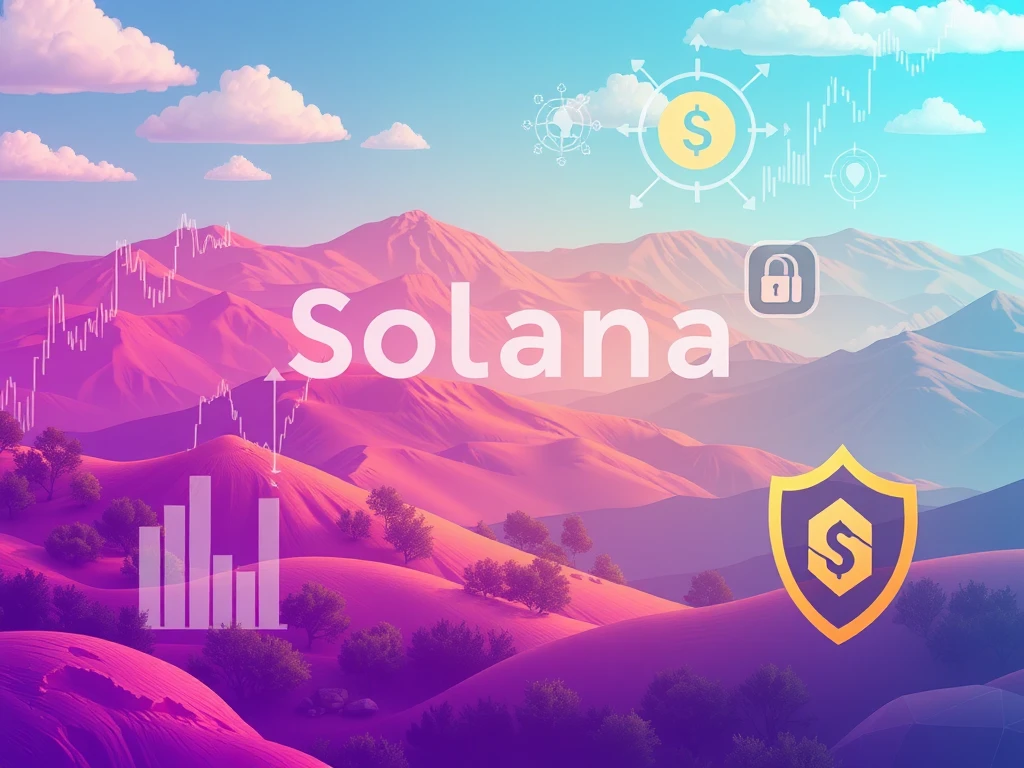Secure Solana: Firms Make Massive Moves in Staking and Compliance

Big news is circulating within the Solana ecosystem, highlighting significant steps taken by key players. For those interested in the growth and institutional adoption of Solana, these developments signal a maturing landscape with a focus on robust operations and future expansion.
Why are Solana Firms Focusing on Treasury and Staking?
Two notable Solana-focused companies, Sol Strategies and DeFi Development Corp., have recently announced strategic maneuvers that underscore deeper commitments to the network. Sol Strategies, a Canadian investment and infrastructure firm, has filed a preliminary base shelf prospectus for up to $1 billion. While this doesn’t mean an immediate offering, it provides the company with the flexibility to access significant capital as opportunities arise within the rapidly evolving Solana ecosystem.
Simultaneously, DeFi Dev, a firm specializing in Solana treasury management, is adopting liquid-staked SOL for its treasury operations. This move follows their substantial addition of SOL to their treasury in late April. By converting part of their Solana holdings into the liquid staking token dfdvSOL, DeFi Dev aims to optimize yield and enhance treasury management efficiency.
Understanding Liquid Staking on Solana
Liquid staking is a crucial innovation in the crypto space, especially for networks like Solana that rely on proof-of-stake. It allows tokenholders to earn staking rewards without locking up their assets. Instead, they receive a liquid token (like dfdvSOL) that represents their staked amount plus earned rewards. This liquid token can then be freely traded or used in other decentralized finance (DeFi) applications, providing greater flexibility and capital efficiency compared to traditional staking methods.
DeFi Dev’s adoption of dfdvSOL is intended to:
- Drive stake towards their own validators.
- Increase overall SOL holdings through staking rewards.
- Strengthen their role as a long-term participant in the Solana ecosystem.
This strategic use of liquid staking highlights a focus on maximizing SOL Per Share growth for the company.
Boosting Confidence Through Compliance
Beyond financial maneuvers, Sol Strategies has placed a strong emphasis on compliance and security, a critical factor for attracting institutional interest. The company recently completed several key audits and certifications for its Solana staking platform, including:
- SOC 2 Type 1 Audit: Assesses controls related to security, availability, processing integrity, confidentiality, or privacy at a specific point in time.
- SOC 1 Type 1 Audit: Focuses on internal controls over financial reporting at a specific point in time.
- ISO 27001 Certification: An international standard for information security management systems, requiring documented and implemented controls to manage risks to data confidentiality, integrity, and availability.
Achieving these standards demonstrates a commitment to robust internal processes and data security, which is essential for building trust with institutional clients looking for reliable partners for their Solana staking needs. These certifications position Sol Strategies as a more credible and secure option for larger investors.
What Do These Moves Mean for Institutional Interest?
The combined actions of Sol Strategies and DeFi Dev point towards increasing institutional engagement within the Solana network. The $1 billion shelf prospectus by Sol Strategies indicates preparation for potentially large-scale capital raises aimed at expanding their Solana-focused operations, including staking infrastructure. DeFi Dev’s sophisticated use of liquid staking for treasury management shows a professional approach to asset growth and yield generation that aligns with institutional financial strategies.
Furthermore, Sol Strategies’ significant investment in compliance and security audits directly addresses common concerns held by institutional investors regarding the nascent crypto market. By adhering to recognized global standards like SOC and ISO, they are building a bridge of trust, making it easier for traditional finance players to consider Solana investments and staking services.
These developments collectively suggest that serious capital and operational rigor are being applied within the Solana ecosystem, moving beyond retail enthusiasm towards attracting larger, more risk-averse participants.
Conclusion: Solana’s Path Towards Maturity
The recent strategic moves by Sol Strategies and DeFi Dev – from preparing for potential large-scale capital access and adopting advanced liquid staking techniques to securing crucial compliance certifications – paint a picture of a Solana ecosystem actively working towards institutional readiness. These efforts in enhancing treasury management, facilitating flexible staking, and prioritizing security and compliance are vital steps in attracting broader investment and solidifying Solana’s position as a major blockchain platform.










